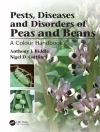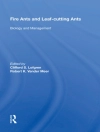The main focus of this book is to survey the current status of research, development and use of agriculturally important microorganisms in Asian countries and develop a strategy for addressing critical issues various policy constraints due to which bio-pesticides have found limited applications.
In this book the editors have tried to develop a consensus on issues of such as quality requirements, quality control, regulatory management, commercialization and marketing of agriculturally important microorganisms in Asian countries. All these issues are discussed at national level by competent authorities of Asian countries including India, China, Malaysia, Iran, Taiwan, Israel, Sri Lanka, Vietnam and Philippines.Innehållsförteckning
Part 1. Introduction.- 1. Synthesis of Policy Support, Quality Control, Regulatory Management of Biopesticides in Sustainable Agriculture.- Part 2. Issues in Commercialization of Agriculturally Important Microorganisms.-
2. Superior Polymeric Formulations and Emerging Innovative Products of Bacterial Inoculants for Sustainable Agriculture.- 3. Formulation and Commercialization of Rhizobia-Asian Scenario.- 4. Regulatory Issues in Commercialization of Bt based Biopesticides.- 5. Beauveria Bassiana as Biocontrol Agent: Formulation and Commercialization for Pest Management.- 6. Commercialization of Arbuscular Mycorrhizal Technology in Agriculture and Forestry.- 7. Bacterial Consortium- A Potential Tool for Safe and Sustainable Organic Agriculture.- 8. Agriculturally Important Microorganisms as Biofertilizers: Commercialization and Regulatory Requirements in Asia.- Part 3. Biopesticide and Biofertilizer Regulatory Requirements in South and Southeast Asia.- 9. Research, Development and Commercialization of Agriculturally Important Microorganisms in Malaysia.- 10. Development and Application of Agriculturally Important Microorganisms in India.- 11. Regulatory Requirements and Registration of Biopesticides in the Philippines.- 12. Biofertilizer Research, Development and Application in Vietnam.- 13. Biopesticides Research: Current Status and Future Trends in Sri Lanka.- Part 4. Biopesticide and Biofertilizer Regulatory Requirements in North Asia.- 14. Commercialization and Regulatory Requirements of Biopesticides in China.- 15. The Registration and Regulation of Biopesticides in Taiwan.- Part 5. Biopesticide and Biofertilizer Regulatory Requirements in West Asia.- 16. Bio-rational, Environmentally Safe Methods for the Control of Soil Pathogens and Pests in Israel.- 17. Present Status and the Future Prospects of Microbial Biopesticides in Iran.
Om författaren
Harikesh Bahadur Singh is Head of the Department of Mycology & Plant Pathology, Institute of Agricultural Sciences, Banaras Hindu University. Prof. Singh has been decorated with several National awards and honors for his key role in popularizing organic farming and translating agriculturally important microorganisms from lab to land. To his credit he has 20 U.S. patents which he has successfully transferred for commercial production of biopesticides to several industrial houses in India.
Birinchi Kumar Sarma is currently working as Associate Professor in the Department of Mycology and Plant Pathology, Institute of Agricultural Sciences, Banaras Hindu University, Varanasi. He received BOYSCAST Fellowship of Department of Science and Technology, New Delhi in 2006 for conducting advanced research on agriculturally important microorganisms at the University of California, Davis, USA. He was honoured with the award of ‘Associate’ of the National Academy of Agricultural Sciences, New Delhi in 2010.
Chetan Keswani is a Post-Doctoral Fellow in the Department of Mycology and Plant Pathology, Institute of Agricultural Sciences, Banaras Hindu University. Trained as a Biochemist he has keen interest in Intellectual Property, Regulatory and Commercialization Issues in Microbiology. He has been a Key Note speaker in several National and International Conferences to discuss various issues in Intellectual Property Regulatory and Commercialization Issues in Microbiology.












